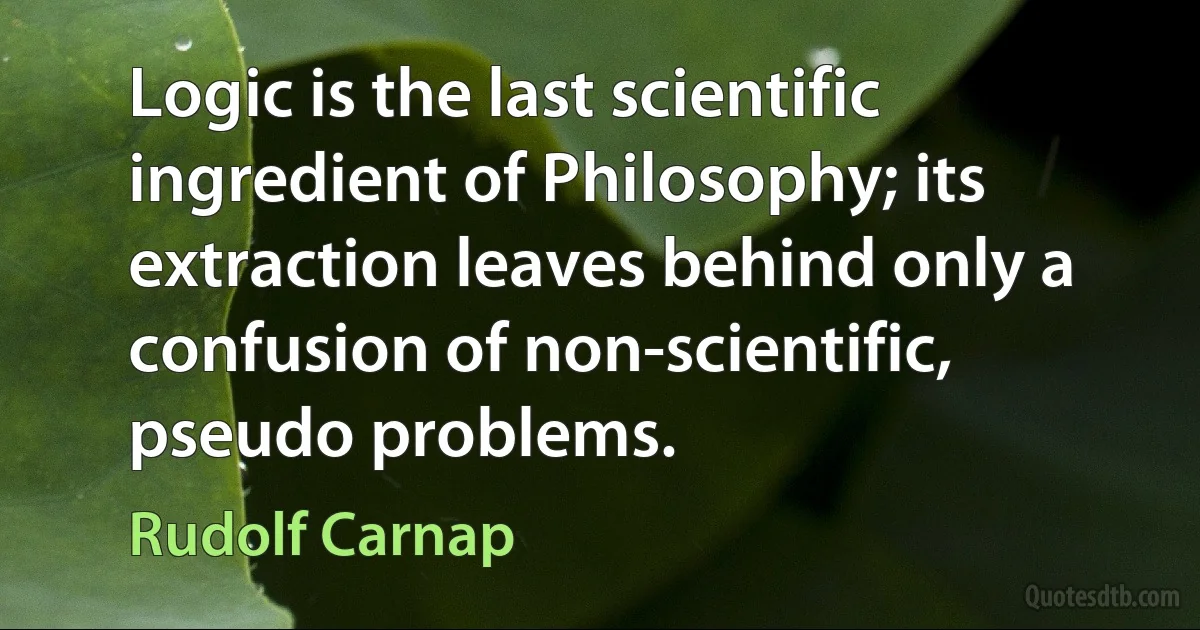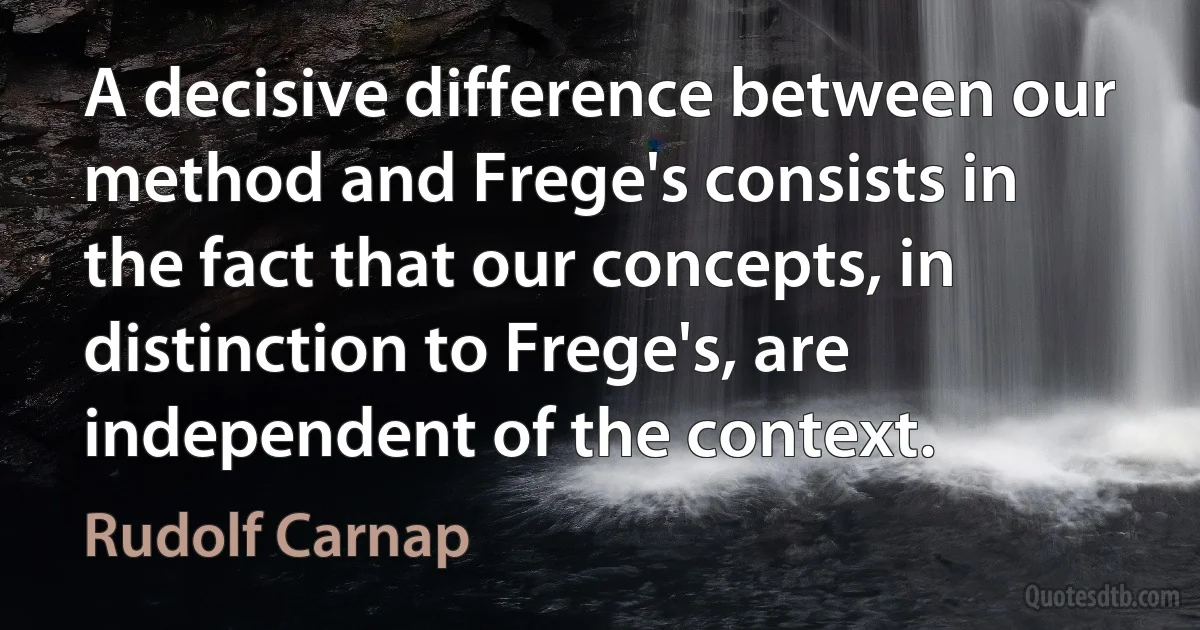Rudolf Carnap quotes
Rudolf Carnap was a German philosopher, widely recognized as a leading figure in the logical positivism movement. His work profoundly influenced analytic philosophy, especially in logic, the philosophy of science, and the analysis of language. He contributed to developing rigorous methods for scientific and philosophical inquiry. Here are 20 of his quotes:
If we compare. e. g. the systems of classical mathematics and of intuitionistic mathematics, we find that the first is much simpler and technically more efficient, while the second is more safe from surprising occurences, e. g. contradictions. At the present time, any estimation of the degree of safety of the system of classical mathematics, in other words, the degree of plausibility of its principles, is rather subjective. The majority of mathematicians seem to regard this degree as sufficiently high for all practical purposes and therefore prefer the application of classical mathematics to that of intuitionistic mathematics. The latter has not, so far as I know, been seriously applied in physics by anybody.

Rudolf Carnap
Logic is not concerned with human behavior in the same sense that physiology, psychology, and social sciences are concerned with it. These sciences formulate laws or universal statements which have as their subject matter human activities as processes in time. Logic, on the contrary, is concerned with relations between factual sentences (or thoughts). If logic ever discusses the truth of factual sentences it does so only conditionally, somewhat as follows: if such-and-such a sentence is true, then such-and-such another sentence is true. Logic itself does not decide whether the first sentence is true, but surrenders that question to one or the other of the empirical sciences.

Rudolf Carnap
The function of logical analysis is to analyse all knowledge, all assertions of science and of everyday life, in order to make clear the sense of each such assertion and the connections between them. One of the principal tasks of the logical analysis of a given proposition is to find out the method of verification for that proposition.

Rudolf Carnap
According to this view, the sentences of metaphysics are pseudo-sentences which on logical analysis are proved to be either empty phrases or phrases which violate the rules of syntax. Of the so-called philosophical problems, the only questions which have any meaning are those of the logic of science. To share this view is to substitute logical syntax for philosophy.

Rudolf Carnap
After defining semantical concepts like logical truth and related ones, I proposed to interpret the modalities as those properties of propositions which correspond to certain semantical properties of the sentences expressing the propositions. For example, a proposition is logically necessary if and only if a sentence expressing it is logically true.

Rudolf Carnap
In order to determine whether or not one sentence is a consequence of another, no reference need be made to the meaning of the sentences. The mere statement of the truth-values is certainly too little; but the statement of the meaning is, on the other hand, too much. It is sufficient that the syntactical design of the sentences be given.

Rudolf Carnap
For those who want to develop or use semantical methods, the decisive question is not the alleged ontological question of the existence of abstract entities but rather the question whether the rise of abstract linguistic forms or, in technical terms, the use of variables beyond those for things (or phenomenal data), is expedient and fruitful for the purposes for which semantical analyses are made, viz. the analysis, interpretation, clarification, or construction of languages of communication, especially languages of science.

Rudolf Carnap
The task of making more exact a vague or not quite exact concept used in everyday life or in an earlier stage of scientific or logical development, or rather of replacing it by a newly constructed, more exact concept, belongs among the most important tasks of logical analysis and logical construction. We call this the task of explicating, or of giving an explication for the earlier concept; this earlier concept, or sometimes the term used for it, is called the explicandum; and the new concept, or its term, is called an explicatum of the old one.

Rudolf Carnap
To be sure, we have to face at this point an important question; but it is a practical, not a theoretical question; it is the question of whether or not to accept the new linguistic forms. The acceptance cannot be judged as being either true or false because it is not an assertion. It can only be judged as being more or less expedient, fruitful, conducive to the aim for which the language is intended. Judgments of this kind supply the motivation for the decision of accepting or rejecting the kind of entities.

Rudolf Carnap
By the logical syntax of a language, we mean the formal theory of the linguistic forms of that language -- the systematic statement of the formal rules which govern it together with the development of the consequences which follow from these rules. A theory, a rule, a definition, or the like is to be called formal when no reference is made in it either to the meaning of the symbols (for examples, the words) or to the sense of the expressions (e. g. the sentences), but simply and solely to the kinds and order of the symbols from which the expressions are constructed.

Rudolf Carnap
The main purpose of this book is the development of a new method for the semantical analysis of meaning, that is, a new method for analyzing and describing the meanings of linguistic expressions. This method, called the method of extension and intension, is developed by modifying and extending certain customary concepts, especially those of class and property. The method will be contrasted with various other semantical methods used in traditional philosophy or by contemporary authors.

Rudolf Carnap
For me personally, Wittgenstein was perhaps the philosopher who, besides Russell and Frege, had the greatest influence on my thinking. The most important insight I gained from his work was the conception that the truth of logical statements is based only on their logical structure and on the meaning of the terms. Logical statements are true under all conceivable circumstances; thus their truth is independent of the contingent facts of the world. On the other hand, it follows that these statements do not say anything about the world and thus have no factual content.

Rudolf Carnap
Rudolf Carnap
Occupation: German PhilosopherBorn: May 18, 1891
Died: September 14, 1970
Quotes count: 20
Wikipedia: Rudolf Carnap












